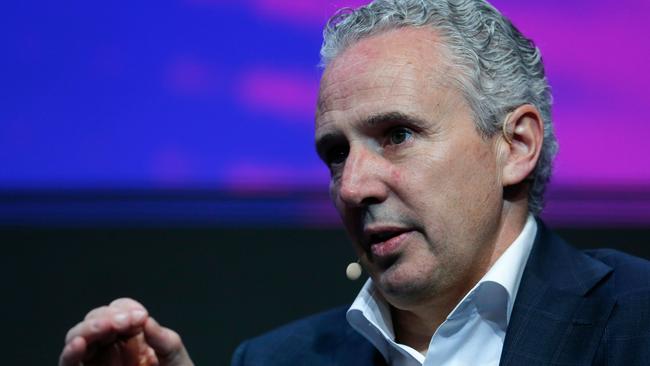5G a hard sell for telcos, Telstra admits
Telstra boss Andrew Penn has conceded that selling the 5G message to shareholders will be a challenge.

Telstra boss Andrew Penn has conceded that selling the 5G message to shareholders will be a challenge, even as it forges ahead with its plan to offer mobile services to customers by the end of this year.
“5G is a highly technical area and the traditional world of telecommunications, which was about electrical engineering, is converging with the world of computing,” he told The Weekend Australian at the Mobile World Congress in Barcelona.
“We have to build capabilities in that world to be successful and generate value not just through connectivity.
“Telcos haven’t had the skills to bring technology solutions like cloud computing, artificial engineering and automation to customers, but we have been building these longer than anyone else and are miles ahead of our competitors.”
Applications and services become increasingly important in the 5G world because telcos won’t be able to charge customers extra for 5G services.
While Telstra’s Network Applications and Services (NAS) unit is designed to provide a suite of value-added services, primarily to enterprise customers, its performance remains patchy.
The unit posted a 4.1 per cent drop in revenue to $1.6 billion for the first half of fiscal 2019. Margins on the NAS business, at 10 per cent, are also lower than what Telstra earns — close to 40 per cent — on its mobile business.
“The profitability is a bit lumpy for the unit and we do need to keep improving that,” Mr Penn said.
While 5G networks may offer services relevant to businesses rather than homes, Telstra’s strategy is focused on providing mobile services to consumers, with the telco signing up a number of deals with handset makers — Samsung, LG and Oppo — to offer 5G phones to consumers.
These 5G phones won’t be cheap, with LG’s flagship V50 set to hit Telstra stores in June sporting a price tag of $1999. With no apparent 5G applications available to justify the high prices, there is considerable doubt on whether consumers will pick up the phones.
However, Mr Penn said that the 5G handsets, even the first-generation ones, were superior to their 4G predecessors. “I have held and used a number of the phones from different manufacturers and they are all really high quality,” he said.
“The manufacturers have been working with and innovating with new antennas, chipsets and battery life.”
He is unperturbed by concerns about the lack of an apparent “killer app”. “There is all this talk about use case but I am not worried about that.
“Put these devices in the hand of customers and we will learn what the killer apps are.
“Customers are the ones who are going to discover where the opportunities will be and we will then use that feedback to invest in those areas and bring them to life.
“One of the things we spend a lot of time thinking about in broadband is downloads, but there are a lot of use cases where you need to look at uploads.”
However, the 5G phones are still unknown entities in the market, and according to analysts are unlikely to end the current softening in the number of smartphones being sold.
According to Fidelity International’s technology analyst Casey McLean, 5G is an evolution, not a revolution, at least for smartphones.
“While 5G will create much higher data speeds and lower latency, the killer app still remains unclear,” he said.
“The introduction over 2019-20 may slightly lift smartphones sales, it is unlikely to be enough to reverse the trend of the lengthening replacement cycle as the category reaches maturity.”
Unlike Telstra, Optus has backed fixed wireless services to deliver 5G-powered high-speed broadband to homes, launching a 50 megabits per second service, priced at $70, last month.
However, Mr Penn downplayed the threat posed by the service to Telstra and the National Broadband Network, saying the technology is hamstrung by a lack of spectrum.
“Fixed wireless is definitely an opportunity with 5G but it only becomes significant through the use of millimetre wave spectrum.
“In the US this spectrum is available and it makes sense for the telcos there to go with fixed wireless. In Australia that spectrum won’t be auctioned until the end of next year.
“So serious fixed wireless won’t be really viable until then.
“Ultimately we will have it but we think the main game in 5G will be mobility.”


